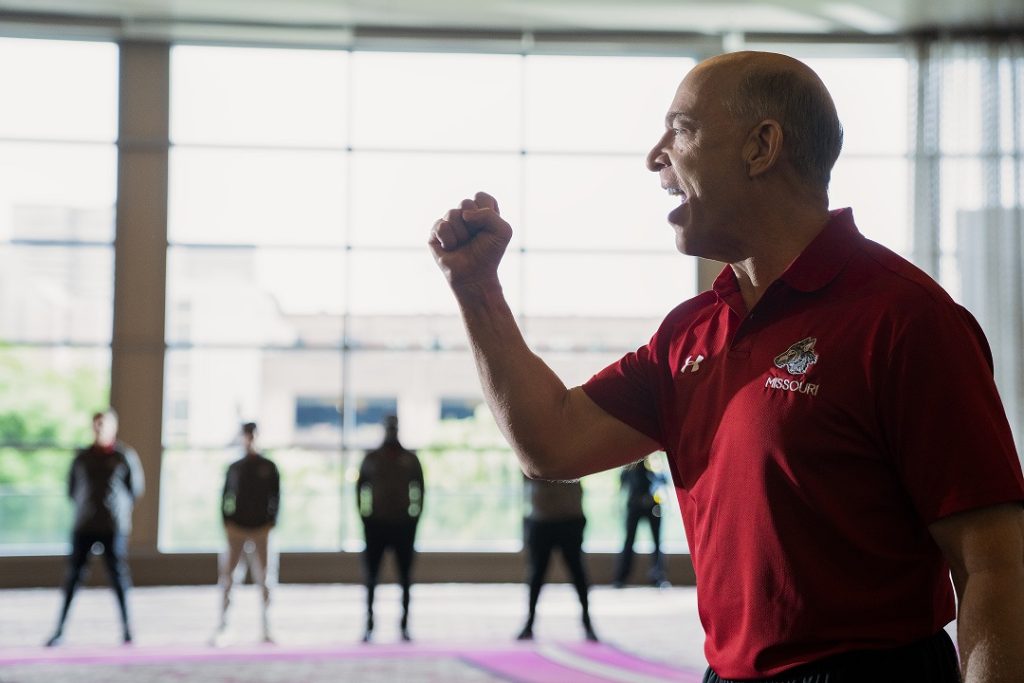
There is a true passion athletes feel when they are playing their chosen sport, energized by the rush of the action around them and the cheers of crowds in the stands. Sports present an opportunity for audiences to be captivated by what they are watching, and the effect is even more profound on those running around the field and collaborating with their teammates. But for even the most skilled and committed players, there are some things that are more important than the game, and which may at times be directly at odds with it. National Champions tells a story of conflict turned into an irreversible call for change.
Quarterback LeMarcus James (Stephan James) is just days away from a crucial national championship game, one that will catapult him, his college football team, and Coach James Lazor (J.K. Simmons) into enduring glory. But James makes a major decision with his teammate Emmett Sunday (Alexander Ludwig) to call for a team-wide boycott, demanding that all student athletes be fairly paid for everything they do.
James and Sunday encounter tremendous resistance from the all-powerful and extremely resourceful machine that they are trying to fight, only further proving their point that the system unfairly favors those with means and deprives those forced to do the real work.

National Champions is billed as a “fictional tale living in an all-too-real and relevant storyline unfolding via today’s headlines.” While its specific events did not occur in the real world as they do in the film, they serve to represent a wider call for reform within the world of sports and so many other industries that disproportionately reward those on top without any concern for those who end up putting in an incredible number of uncompensated hours. That this is a known phenomenon that widely persists is inexcusable, and this film presents one story of a refusal to continue to accept the status quo.
There is a deep religious undercurrent to this film that persists throughout, one that casts James as a leader not just for those with faith in a specific deity but in the goodness of humanity and its ability to overcome and fix a broken system. That devoutness and commitment to change stands in stark contrast to those who rally against what James is fighting for, coming armed with obstacles to progress and the commonplace argument that those at the bottom of the food chain should be grateful for what they do have rather than question why they have so little and are treated so poorly.

Photo credit: Scott Garfield/Courtesy of STX Films
This film doesn’t pretend that circumstances are simple or that one easy solution could mend all that is unjust in the world. But it does choose to tackle the complexities head-on, not only with a resolute James and an equally stubborn line of resistance, but with characters like Katherine Poe (Uzo Aduba), whose role as a fixer makes her seem unsympathetic to James’ cause but reveals a less expected background that makes her job incongruent with her history. Similarly, Coach Lazor is not one-dimensional, unable to prevent his impulses from guiding his behavior but capable of more substance when he takes a moment to contemplate how he truly feels.
While National Champions boasts an impressive cast that also includes Kristin Chenoweth, Timothy Olyphant, David Koechner, and Jeffrey Donovan, this platform doesn’t enable any of them to truly shine. While some are given standout monologues, the film’s script never reaches a sincere breakthrough. The idea behind the film is absolutely worthwhile, and there is plenty to unpack from its systemic inspirations.
But as a film in its own right, it might have been better served to adapt actual events for a fully compelling experience.
Grade: B-
National Champions opens in theaters on December 10th.

